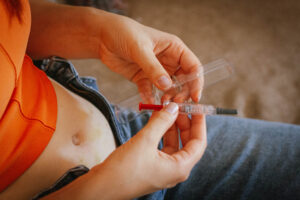Here’s a guide to egg donor IVF, including the process, treatment cost, and success rates of using a donor egg for IVF.
If you’re discussing your fertility options with your partner or a fertility specialist, you’re likely examining all your assisted reproductive technology (ART) options. Thanks to years of medical research and discovery, many cutting-edge fertility procedures may be right for you. One of these is in vitro fertilization (IVF), the process of combining an egg and sperm in vitro (outside the body) and then transferring it into a uterus in the hopes of achieving a successful pregnancy.
In some cases, IVF may not be successful, which could be due to the quality of the eggs. For LGBTQ+ couples or gay men who do not produce eggs or have low egg quality, IVF requires an egg donor as well as a gestational carrier (surrogate).
What is Egg Donation?
Egg donation is when a woman donates her eggs to prospective parents-to-be to help start or expand their family.
Finding an Egg Donor
You can find an egg donor in various ways. Many fertility clinics have an in-house egg donor program for couples to choose an anonymous egg donor to combine with their or a donor’s sperm.
You can also choose an egg donor from many outside egg donor agencies or an egg bank (which provides frozen eggs). In other instances, a couple may know someone personally that is interested in being an egg donor for them.
Benefits of Using an In-House Egg Donor Program
The avenue you take to find an egg donor is unique to your situation and family goals. There are some benefits to choosing an in-house egg donor program in the same location your IVF treatment is being provided. Working with your fertility clinic’s in-house egg donor program can make the entire process more seamless and possibly more cost-effective.
How to Choose an Egg Donor

Regardless of whether you utilize your clinic’s egg donor program or a third-party egg donor agency, it’s important to identify what you’re looking for in an egg donor. You should determine which are high-priorities or non-negotiables and others that are more flexible desires. Make sure to speak to your provider or egg donor coordinator about the characteristics that are important to you in an egg donor, such as height, ethnicity, eye color, and more. Some couples want their child resembling them, while others may not have a preference. Other considerations include the type of donor arrangement you’re looking for.
What Are the Success Rates of Using a Donor Egg With IVF?
IVF has a high success rate after one cycle. This is usually dependent on the donor eggs’ age and the recipient’s health, both of which you’ll be able to largely control as you go through the egg donor process. According to SART, the success rate using donor eggs for IVF is 39.5%. If using frozen eggs, the success rate is 37.3%. Doing IVF with thawed embryos has a success rate of 44.8%, according to SART.
Who Benefits from Egg Donation?
Gay male couples need an egg donor to help create a biological child through their surrogate (also known as a gestational carrier). Similarly, an LGBTQ+ couple where both people produce eggs, yet perhaps the egg quality or health has not proven successful in fertility treatments, may decide to use an egg donor.
Couples who do not have a high egg reserve, or have stopped producing eggs (due to menopause or other reasons), can also choose egg donation as a possible avenue to have a baby. The reasons for choosing an egg donor are limitless; anyone who cannot get pregnant with their own eggs or who does not produce eggs can benefit from egg donation or an egg donor as a part of their fertility treatment journey.
What Is the Process of Egg Donor IVF?
Step 1: A Consultation With a Fertility Specialist
In this initial meeting, you’ll discuss your treatment options and what to expect on your donor egg IVF journey.
Step 2: Contracts Are Outlined and Signed
When you’ve chosen an egg donor, the recipient and donor will need to sync their cycles with the intended parent or surrogate to make the chances of IVF successful. Before this happens, however, there will be legal contracts to outline and sign. Your fertility clinic will walk you through this so that all parties understand the requirements.
Step 3: Genetic and Mental Health Testing
Both the egg donor and recipient will go through several genetic tests to rule out any abnormalities or risks with pregnancy for the recipient. Additional tests may include tests for infections such as HIV, hepatitis B and C, gonorrhea, chlamydia, and syphilis.
Mental health screenings are also conducted for the egg donor, and the results from this test may be available for couples to consider when deciding on an egg donor. For those interested in split-cycle IVF, egg donors will be screened to ensure that they can produce enough eggs for a two-sperm cycle. An egg donor’s obligation ends after the egg retrieval – but this process can take four weeks or more if additional cycles are required.
Step 4: The Egg Donor Stimulation and Retrieval
 The egg donor will begin taking medication to stimulate the ovaries to produce multiple eggs. This process is closely monitored through ultrasound and blood tests to ensure that the eggs are maturing properly.
The egg donor will begin taking medication to stimulate the ovaries to produce multiple eggs. This process is closely monitored through ultrasound and blood tests to ensure that the eggs are maturing properly.
Once the eggs have reached a suitable maturity level, the egg retrieval procedure will be performed. The egg retrieval procedure is done under sedation or general anesthesia; it’s performed via a transvaginal ultrasound-guided needle to retrieve the eggs from the ovaries.
Step 5: Fertilization and Embryo Development
The retrieved eggs will then be fertilized with the intended father’s sperm or a sperm donor’s sperm. This can be done through traditional insemination or intracytoplasmic sperm injection (ICSI).
The fertilized eggs will be monitored for development. Once they reach the appropriate stage, they will be transferred to an incubator for further growth and development into an embryo blastocyst.
It is discussed ahead of time how many embryos are to be transferred, and any extra embryos can be frozen for future use.
Step 6: Embryo Transfer
Fresh Transfer: Egg Donor and Surrogate Sync Cycles
During fresh embryo transfers, the cycles of the egg donor and the surrogate are usually synced with birth control. Once synced, the egg donor will administer fertility drugs to stimulate egg production. This will mimic a standard IVF cycle minus the embryo transfer.
Meanwhile, the recipient (the surrogate or intended parent that will be carrying the pregnancy) will take estrogen and other medications to prepare the uterine lining for an embryo transfer. When the egg donor’s ovaries are ready to release eggs, they are given what’s referred to as a “trigger shot” – a human chorionic gonadotropin (hCG) to cause ovulation.
At the same time, the recipient takes progesterone to prepare for the embryo transfer. Progesterone is taken until the day of the transfer and will be continued for up to 10 weeks if pregnancy is achieved. This is considered a fresh transfer.
Frozen Embryo Transfer
Alternatively, we can create embryos and freeze them at the blastocyst stage. The recipient will then go through a frozen embryo transfer cycle. Since the embryos have already been created and frozen, they can be thawed and transferred to the surrogate’s uterus at any time, regardless of her menstrual cycle. This eliminates the need for the egg donor and surrogate to coordinate their cycles, which can make the process more convenient for all parties involved.
It’s important to note that even though the cycles don’t have to be synced, the timing of the transfer is still important. The transfer must happen when the lining of the uterus is receptive, with the right thickness, and with the right blood flow. The timing of the transfer is determined by your physician based on the patient’s cycle and ultrasound results.
Step 7: Pregnancy and Early Monitoring
 Two weeks after the transfer, a pregnancy test will be done to confirm if the surrogacy was successful. The test can be a blood test (beta hCG) or a urine test. If the pregnancy test is positive, an ultrasound will be administered to confirm the pregnancy and check for the number of implanted embryos and the development of the pregnancy.
Two weeks after the transfer, a pregnancy test will be done to confirm if the surrogacy was successful. The test can be a blood test (beta hCG) or a urine test. If the pregnancy test is positive, an ultrasound will be administered to confirm the pregnancy and check for the number of implanted embryos and the development of the pregnancy.
If the pregnancy is confirmed, the surrogate will continue with early monitoring with the fertility clinic until about 8-10 weeks, when they’ll transfer to the care of their OB/GYN. This will include regular check-ups, blood tests, and ultrasound scans to monitor the health of the pregnancy.
Step 8: Delivery
The intended parents will be involved in the prenatal care and will be able to prepare for the arrival of their baby. The birth will happen in a hospital and the intended parents will be able to be present for the delivery.
How Much Does Using a Donor Egg With IVF Cost?
Next to choosing an egg donor, discussing the costs of using a donor egg with IVF is an important topic you should address with your fertility specialist.
- Egg donors receive compensation for their eggs, and this can range anywhere between $6,000 and $10,000 for one cycle of egg donation. Egg donor compensation typically increases with additional donation cycles.
- In addition to the cost of donor eggs is the cost of an IVF cycle. This can range anywhere from $15,000 to $30,000 for one cycle of IVF. If additional cycles are needed, this fee will increase. Cost increases may also occur depending on what type of genetic testing is done or if you are doing split-cycle IVF, which allows both males to provide sperm for the pregnancy.
- If using a gestational carrier, intended parents can expect to pay a range between $50,000 to $150,000 or more which includes the compensation for the gestational carrier, legal fees, medical expenses, insurance, and any other related expenses. It’s important to note that these figures are approximate and can vary depending on the location and the specific circumstances of the intended parents and the gestational carrier.
It’s important to consult with a fertility specialist to get a detailed cost estimation that is specific to your case before making any decisions.
Thinking about the cost of fertility treatments can be overwhelming for couples, but it shouldn’t halt your plans to expand your family. It’s important to speak to your medical insurance company before you start any fertility treatments. Depending on your coverage, a portion of services may be covered. Fertility clinics often have grants or assistance for couples – speak to your specialist so they can explain options to alleviate stress over the financial commitment.
Egg Donors Can Become the Bridge You Need to Start a Family
Using donor eggs to start or expand your family ensures that you and your partner have a say in the process. Find a Pinnacle Fertility Clinic near you and schedule a consultation today. We’re here to answer all of your questions, from the criteria you want in an egg donor, to what you can expect every step of the way.
Love is what makes a family, and we’re here to help you achieve the full picture of the family that you want and deserve.
